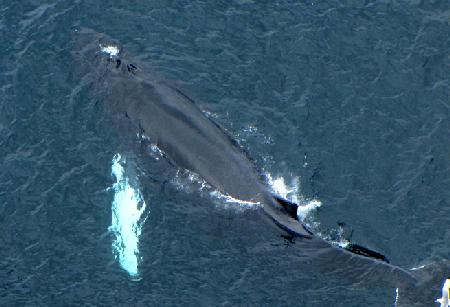
Humpback whale surfaces for air. Note the blowhole over the head through which it breathes.
Whales present a puzzle: although they live in the sea, they have many of the traits of land-living mammals. Unlike fish which breathe through gills, whales must surface to breathe the air with blowholes on their backs. Their anatomy is also typical of mammals: they are warm-blooded and they nurse their young with milk from mammary glands. They even have similar skeletons, including tiny vestigial remnants of the pelvis and hind legs.
At the same time, whales are highly adapted to life in the sea and cannot survive on land.[1] Their front limbs have become fins and their tails have developed flukes, so that superficially they resemble fish.
Since mammals evolved on land, this raises several questions: How did the ancestors of whales make this transition to the sea? Where do they lie on the evolutionary tree of life? Is there any fossil evidence of intermediate organisms?
Whales spend their whole lives in the sea. This is in distinction to other aquatic mammals like seals, sea lions, walruses and otters, which live both on land and in water.
Credit is usual given to the naturalist John Ray for being the first, in 1693, to record that whales are mammals (see whales on TalkOrigins). Linnaeus put them down as mammals in his classification system in the 18th century.
In the original 1859 version of On the Origin of Species, Charles Darwin proposed (erroneously, as we shall see) that whales were descended from bears:
"In North America the black bear was seen by Hearne swimming for hours with widely open mouth, thus catching, like a whale, insects in the water. Even in so extreme a case as this, if the supply of insects were constant, and if better adapted competitors did not already exist in the country, I can see no difficulty in a race of bears being rendered, by natural selection, more and more aquatic in their structure and habits, with larger and larger mouths, till a creature was produced as monstrous as a whale."
However, within two years, he withdrew the theory from future publications of his book.
Author: Tom Brown
Copyright: public domain
Date last modified: 11th Oct 2011
Peer-review status: Not yet peer-reviewed
Humpback whale: source: Wikipedia, copyright: CC, Attribution Share Alike